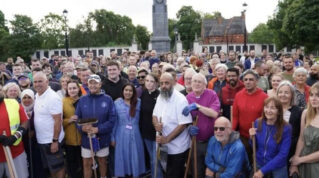Students at a north west college group will be automatically registered to vote when they enrol this year, in what is thought to be a first in the sector.
Run by Trafford and Stockport College Group (TSCG) , the trial scheme – starting this month – involves an “opt-in to register to vote” on new students’ enrolment forms.
This allows the college to share students’ information with local electoral registration office, ensuring they can vote once they turn 18.
The college is believed to be the first in England to run such a scheme, which aims to improve low levels of voter registration for 16- to 18-year-olds.
TSCG’s head of personal and professional development, Michelle McLaughlin, who led the scheme, said she hopes it is used as a blueprint for other colleges.
James Scott, the college group’s principal, said: “By automatically registering students to vote as part of the enrolment process, we are carrying out a civic duty and supporting an important transition from childhood to adulthood.
“Young people are significantly less likely to vote than older people, and if we don’t engage them early, we risk losing a generation of voters.”
Although the ‘opt-in’ scheme only currently applies to students living in Stockport, the college said its staff have been helping students in other areas register themselves to vote online.
A study by the Institute For Public Policy Research (IPPR) found that only half of adults voted at the 2024 general elections, the lowest share of the population since universal suffrage.
Constituencies where a larger share of the population is older also had a higher turnout.
Market research company Ipsos MORI estimates that only 36 per cent of 18 to 24-year-olds voted in the last general election, the lowest of any age group.
Younger age groups are thought to have voted the least in the last decade of general elections in the United Kingdom.
Ahead of the election, Labour pledged to reduce the voting age from 18 to 16, but legislation to do this was not included in the 40 bills in the King’s Speech last month.
However, Commons leader Lucy Powell has said the party still hopes the change could be made before the next general election.
The TSCG initiative is part of a wider drive to find effective ways to encourage young people to vote, led nationally by social purpose strategy firm Purpose Union, in collaboration with the Politics Project and financial support from the UK Democracy Fund.
Purpose Union hopes to build on its reported success with a similar initiative running at some universities.
However, both colleges and universities face similar challenges with setting it up, due to the need for data sharing agreements with local authorities that their students live in.
Lydia Richmond, an associate director at Purpose Union, said: “Getting the next generation registered to vote is fundamental for ensuring civic engagement.
“We hope, following in Michelle’s example, more colleges adopt auto-enrolment to increase student voter registration in further education.
“It is clear to see Michelle’s passion for, and belief in, politics is at the heart of her work. It’s a leading example for other colleges looking to involve their students more in civic responsibility.”
Purpose Union and the Politics Project are now planning a series of workshops to encourage other colleges to sign up – and ultimately hope for a national data sharing agreement colleges and universities can sign up to more easily.

















It’s a start, but registering people to vote if they don’t know what they’re voting for is perhaps doing democracy a disservice.
How about making a short course on politics and democracy (say 20 hours) a condition of funding. In the course could be content on the history of democracy and politics, what left and right means, party funding, the role the media plays and of course a calculation of how many manifesto promises have been kept in the last 50 years or so.
Real democracy, after all, is where all individuals play an active and equal role as part of society, not a process where it’s done to them…
Great idea as part of British Values and raising awareness of the right to vote. It is not as suggested above tied to the need to a 20 hour course. Perhaps more on that needs to have been done by schools. 20 hours equates to a week and a half of a full-time course